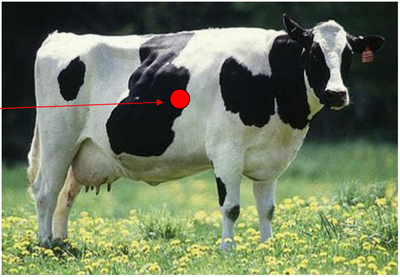Point Particle Systems: Difference between revisions
Akerrison3 (talk | contribs) |
Akerrison3 (talk | contribs) |
||
| Line 14: | Line 14: | ||
In the point particle system, total change in energy is equal to the total change in kinetic energy. Because of the energy principle, [[File:Energy_work.png|70 px]], where '''delta E''' is change in total energy and '''W''' is work, the change in translational kinetic energy is equal to work. Remember, work is equal to [[File:Change_in_trans.png|50 px]] as well. | In the point particle system, total change in energy is equal to the total change in kinetic energy. Because of the energy principle, [[File:Energy_work.png|70 px]], where '''delta E''' is change in total energy and '''W''' is work, the change in translational kinetic energy is equal to work. Remember, work is equal to [[File:Change_in_trans.png|50 px]] as well. | ||
==Examples== | ==Examples== | ||
Revision as of 21:37, 30 November 2015
This topic has been claimed akerrison3.
The Main Idea
The point particle method of measuring changes in energy simplifies the system of interest down to a single point, or focuses on its center of mass. Therefore, the only energy changing in the system is translational kinetic energy. Translational kinetic energy is the energy that comes from an object moving from one location to another. This can then be used in the extended system of the object, which includes all energy transfers.
 Center of Mass of a Cow as a Point
Center of Mass of a Cow as a Point
A Mathematical Model
Translational kinetic energy is equal to  , where M is mass and v is the velocity of the center of mass.
, where M is mass and v is the velocity of the center of mass.
The change in translational kinetic energy is equal to ![]() , where F is the net force acting on the object and delta r is the change in position of the object center of mass.
, where F is the net force acting on the object and delta r is the change in position of the object center of mass.
In the point particle system, total change in energy is equal to the total change in kinetic energy. Because of the energy principle, ![]() , where delta E is change in total energy and W is work, the change in translational kinetic energy is equal to work. Remember, work is equal to
, where delta E is change in total energy and W is work, the change in translational kinetic energy is equal to work. Remember, work is equal to ![]() as well.
as well.
Examples
Be sure to show all steps in your solution and include diagrams whenever possible
Simple
Middling
Difficult
Connectedness
- How is this topic connected to something that you are interested in?
- How is it connected to your major?
- Is there an interesting industrial application?
History
Put this idea in historical context. Give the reader the Who, What, When, Where, and Why.
See also
Are there related topics or categories in this wiki resource for the curious reader to explore? How does this topic fit into that context?
Further reading
Books, Articles or other print media on this topic
External links
Internet resources on this topic
References
This section contains the the references you used while writing this page